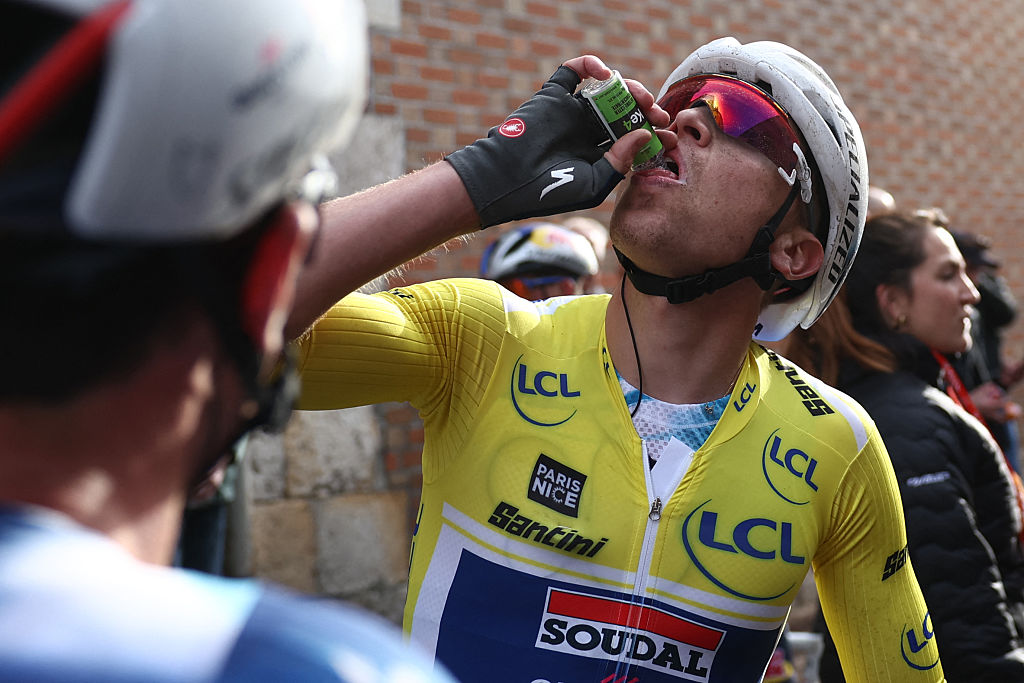UCI recommends against use of legal ketone supplements among professional cyclists due to lack of evidence of performance benefits
Ketones remain legal but UCI joins MPCC in stance against their use

The latest race content, interviews, features, reviews and expert buying guides, direct to your inbox!
You are now subscribed
Your newsletter sign-up was successful
Cycling's governing body, the UCI, has today set out its position against the use of ketone supplements for the first time, saying it "sees no reason for them to be used" by professional cyclists.
Ketone supplement use has become increasingly popular among cyclists and endurance athletes, with riders openly drinking from small bottles of ketone supplements after races, as casually as they would ingest cherry juice or a sugary recovery drink.
However, the UCI has now come out against their use, not because they are too performance enhancing, but in fact because their benefits are not proven.
Ketones are chemicals that the liver produces that can then be used by the muscles instead of glucose when there in insufficient glucose in the body. Though naturally produced by the body, ketone levels can be increased by taking ketone supplements, which may offer increased performance and recovery.
These supplements are currently legal in sport and not on WADA's banned substance list, and have become increasingly popular in cycling in the last five years, but also a cause of division, with some embracing their use and others warning against them.
In 2024, the MPCC – the Mouvement Pour un Cyclisme Crédible, a group cycling teams voluntarily sign up to and exists to clarify the grey areas around doping – set out their position on ketones, recommending against their use.
The MPCC urged the UCI to state their position on ketones too, and criticised the fact that the governing body did not intend to publish their assessment on the supplement until 2025.
The latest race content, interviews, features, reviews and expert buying guides, direct to your inbox!
Despite the MPCC's request, the UCI only published their statement on the topic on Monday, stating that due to recent studies contradicting the early studies outlining the benefits of ketones,
"The use of dietary supplements containing ketone bodies (ketones) has become popular in endurance sports, particularly road cycling, since the publication of scientific findings of a study carried out in 2016. Results of the study suggested that ketones taken before or during exercise could improve cycling performance," the statement read.
"However, these results were not confirmed by subsequent studies, and there is now a consensus that such supplements have no effect on performance during endurance exercise.
"However, several ensuing studies then drew attention to the potential benefits of ketones when it comes to the rapidity and quality of post-exercise recovery. Ketones were found to have added value in terms of the speed of muscle glycogen resynthesis and endogenous EPO production.
"More recently, research has now contradicted these earlier findings. The results of a very comprehensive, high-quality study show that taking ketones after competition or high-intensity training sessions has no effect on the quality of recovery."
As a result of the studies on ketone use for both performance enhancement and recovery improvement, the UCI concluded against their usefulness.
"As there is no compelling evidence that ketone supplements enhance performance or recovery, the UCI sees no reason for them to be used," the statement said. "Therefore, the UCI does not recommend the inclusion of such supplements in riders' nutritional plans."
As a governing body that is part of the WADA system, the UCI's position is not legally and formally binding in any way, and only a recommendation – ketone supplements remain legal. They will not be tested for as a banned substance, nor will the UCI, at present, regulate against their use.
The MPCC's ruling against ketones is in some ways more binding, as the teams that are part of the organisation (including eight WorldTour teams and four Women's WorldTour teams) are obliged to follow their rules or face penalties. However, Cyclingnews understands that some MPCC-affiliated riders have continued to use ketones.
Despite many bodies coming out against ketone use, they have become an increasingly popular and mainstream sports supplement, with sponsorships and adverts from ketone brands appearing on riders' social media channels and some cycling podcasts in recent years.
Matilda is an NCTJ-qualified journalist based in the UK who joined Cyclingnews in March 2025. Prior to that, she worked as the Racing News Editor at GCN, and extensively as a freelancer contributing to Cyclingnews, Cycling Weekly, Velo, Rouleur, Escape Collective, Red Bull and more. She has reported from many of the biggest events on the calendar, including the Giro d'Italia, Tour de France Femmes, Tour of Flanders and Paris-Roubaix. She has particular experience and expertise in women's cycling, and women's sport in general. She is a graduate of modern languages and sports journalism.
You must confirm your public display name before commenting
Please logout and then login again, you will then be prompted to enter your display name.
